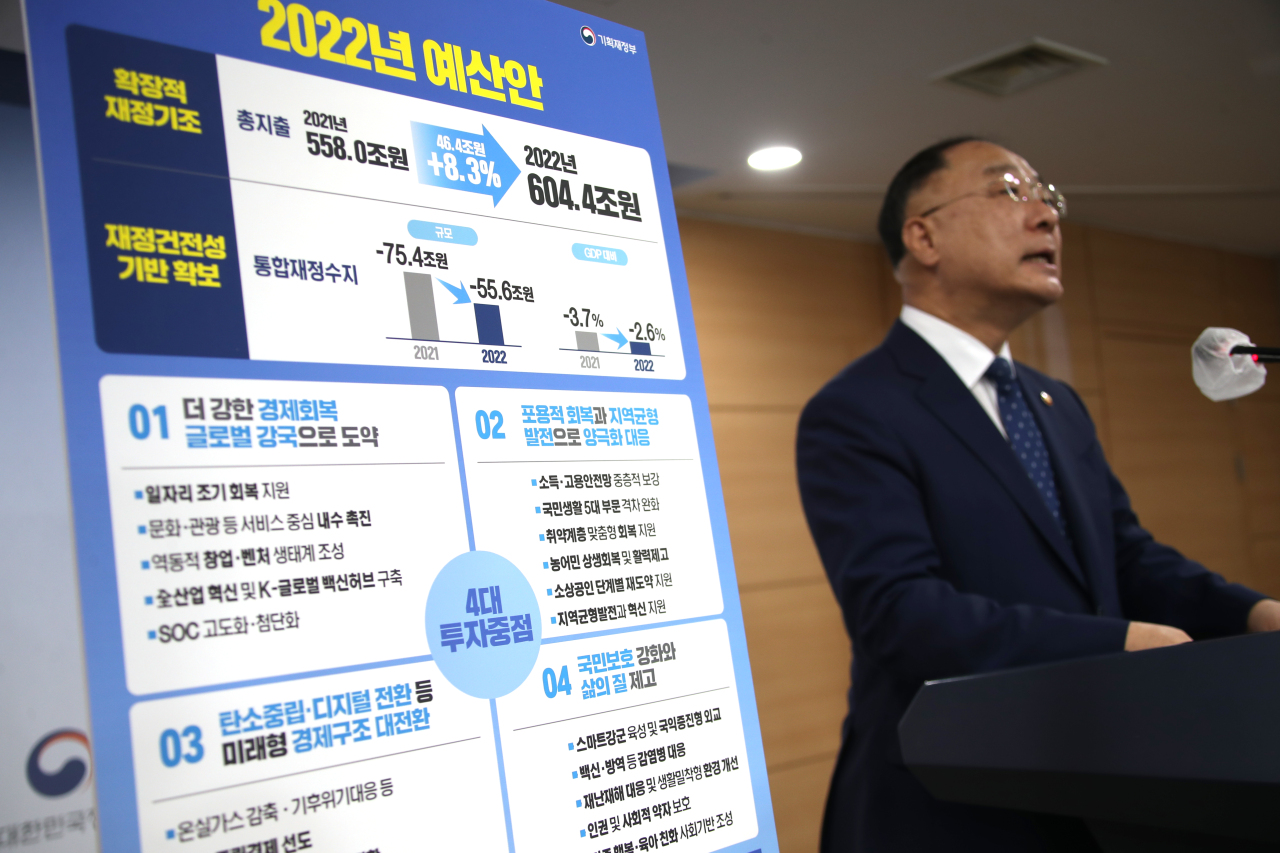Korea proposes largest-ever budget to speed up recovery of virus-hit economy
Moon keeps expansionary stance for his final year despite growing criticism over the nation’s worsening fiscal soundness
By Park Han-naPublished : Aug. 31, 2021 - 17:14

South Korea on Tuesday proposed a record 604.4 trillion won ($519 billion) budget for 2022, stressing the need for an expansionary fiscal policy to help the economy recover from the COVID-19 pandemic.
The budget, endorsed by the Cabinet on Tuesday, represents an 8.3 percent hike from this year, less than the 8.9 percent increase for 2021 and 9.1 percent for 2020, according to the Ministry of Economy and Finance.
The Moon Jae-in government’s final budget draft, however, has come under fire from opponents that it would worsen the nation’s fiscal soundness. The current administration has already been blamed for failing to put a brake on accelerating social and economic polarization despite its enlarged spending in recent years.
The budget plan came as the ongoing resurgence of COVID-19 has cast a pall over the government’s goal of a 4.2 percent economic growth this year and 3 percent next year. Private consumption still remains stagnant, although exports bounced into positive terrain on the back of a global economic recovery.
“At a time when the coronavirus crisis has greatly dampened the private sector, aggressive fiscal policy is playing a role in boosting private investment and consumption by serving as priming water for economic recovery,” President Moon said during a Cabinet meeting held at Cheong Wa Dae.
With Moon keeping his expansionary fiscal policy, the nation’s sovereign debt and ratio of national debt to gross domestic product, a barometer of the country’s fiscal soundness, are expected to hit record highs.
According to the ministry, the national debt is estimated to stand at 1,068.3 trillion won next year and the national debt-to-gross domestic product ratio is forecast to increase to 50.2 percent from 47.3 percent this year.
While hinting at gradual normalizing stimulus measures in 2023, Finance Minister Hong Nam-ki also stressed that the expansionary fiscal policy is still a prerequisite for buttressing recovery efforts to normalize Asia’s fourth-largest economy.
“We are facing great economic and social challenges that need policy support, including the fallout of the pandemic which will likely extend into next year and demand for an inclusive recovery to resolve (income) inequalities as well as the transition to a digital and low-carbon economy,” he said during a press briefing.
More than one-third, or 216.7 trillion won, of the budget will be spent on health care, social welfare and job creation, while 14 percent will be allocated to the education sector.
Due to the prolonged pandemic, small-business owners and the self-employed have continued to bear the brunt of the damages due to social distancing rules that have been raised to the highest level for Seoul and its surrounding areas.
To tackle such issues, the budget proposal calls for boosting spending on job creation while shifting the focus of the job budget from crisis response to future preparation in line with changes in the employment and industrial structures.
Some 31.3 trillion won will be earmarked to create 2.11 million jobs. About half of the positions, 1.05 million, will be created in the public sector mostly for senior citizens and other vulnerable groups in the labor market. The country will set aside 1.8 trillion won to compensate the self-employed for their losses caused by state orders to shut down or suspend business operations over the pandemic.
For young people, 23.5 trillion won will be designated for the creation of their assets, jobs and housing. The upper age limit for a child care subsidy program will be expanded from children under the age of 7 to 8. Some 2 million won will be given to families when their first child is born.
The country plans to spend 11.9 trillion won for the environment sector to achieve its goal of going carbon neutral by 2050. Under the proposal, it envisions adding 500,000 eco-friendly cars and a 2.5 trillion-won fund for fighting climate change.
To purchase more COVID-19 vaccines and beef up antivirus efforts, the government will allocate a total of 5.8 trillion won. About 700 billion won will be earmarked to finance a project to turn Korea into a global vaccine production hub, the ministry said.



![[Exclusive] Korean military set to ban iPhones over 'security' concerns](http://res.heraldm.com/phpwas/restmb_idxmake.php?idx=644&simg=/content/image/2024/04/23/20240423050599_0.jpg&u=20240423183955)

![[Graphic News] 77% of young Koreans still financially dependent](http://res.heraldm.com/phpwas/restmb_idxmake.php?idx=644&simg=/content/image/2024/04/22/20240422050762_0.gif&u=)



![[Pressure points] Leggings in public: Fashion statement or social faux pas?](http://res.heraldm.com/phpwas/restmb_idxmake.php?idx=644&simg=/content/image/2024/04/23/20240423050669_0.jpg&u=)










